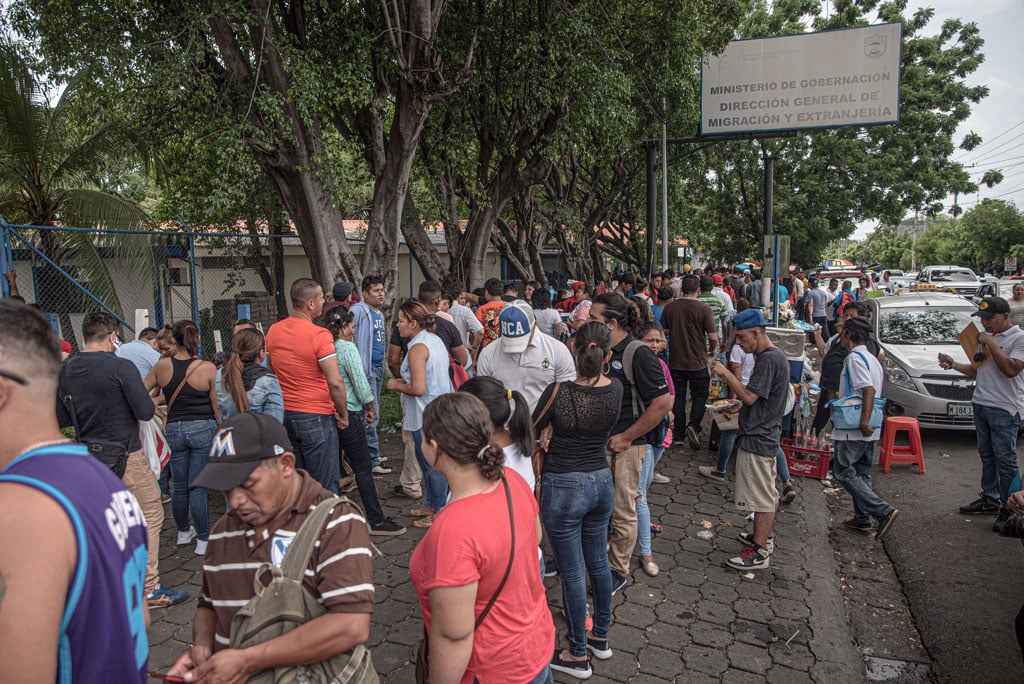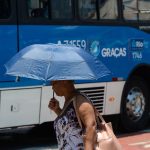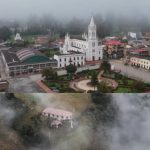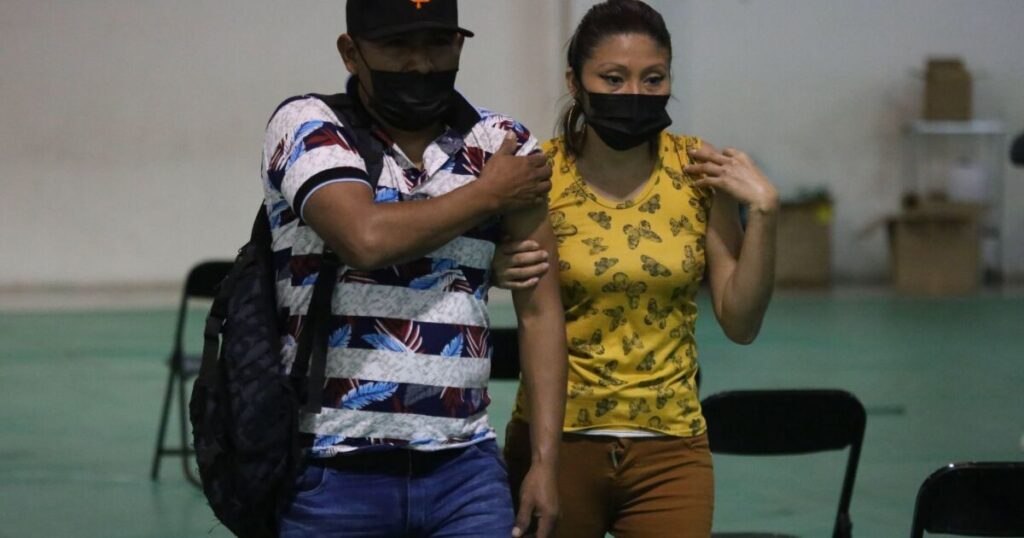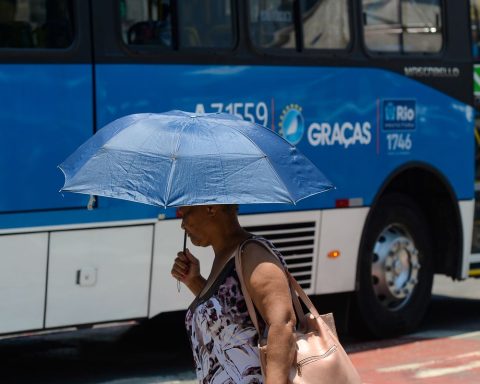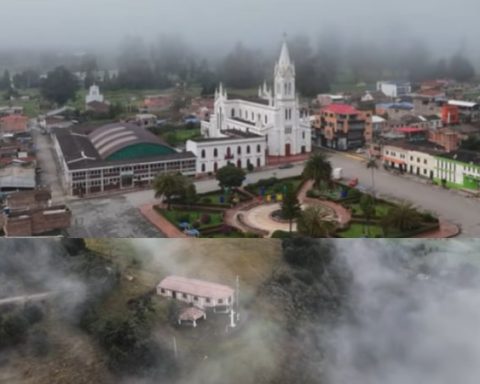The General Directorate of Migration and Immigration of Nicaragua collected more than 1,273 million córdobas for “other service fees”, between January 2018 and March 2022, according to budget liquidation reports from the Ministry of Finance and Public Credit, analyzed by CONFIDENTIAL. The amount is equivalent to more than 75% of the income of Migration –which totaled 1689.7 million córdobas in that period–, but despite being millionaire income, there is no detail about their origin.
The lack of references to the origin of this money weakens transparency, prevents citizen oversight and opens the door to irregularities, values a budget expert consulted on these official data.
The millionaire amounts also show a “collection voracity” of the State, adds the former opposition deputy Eliseo Núñez Morales.
The analysis of CONFIDENTIAL, on collections for services of the General Directorate of Migration and Foreigners (DGME), was based on the budget settlement reports for 2018, 2019, 2020, 2021 and the first quarter of 2022, published by the Treasury. These reports list about twenty goods and services provided by different State entities, including five that correspond to this General Directorate.
These five concepts of services are: residence card procedures, extension of stay, immigration office, expediting of passports and “other fees for services”, which is the highest and is not specified.
Unlike the four services that are identified, the “other service fees” is not established in Law 761 or General Law of Migration and Foreigners, published in 2011, nor in its reform and additions (Law 1033), published in August 2020, in which the amounts were updated and established in dollars, replacing the córdoba, which is the local currency.
According to these laws, the DGME has established at least eight differentiated charges for services for nationals —including the speeding up of passports— and twelve types for the multiple visa service.
The state documents do not provide details to know how much each of these services contributes to the state revenue budget, and only loose data is mentioned on the number of procedures in certain services, such as passport procedures abroad, passports to the body Nicaraguan diplomat based outside the country, or nationality resolutions, with data from 2019, 2020 and 2021.
The charges were seen as extortion
Before the Migration Law was in force in 2011, charging institutions for services was considered by tax experts to be illegal. They described them as an “extortion” to the citizens. In addition, it was argued that this State dependency could not assume powers of the Assembly, such as the creation of taxes, as established in article 114 of the current Political Constitution.
In terms of transparency, the lack of details on income is a problem for experts.
“The ideal should be that not only a pocket be established, but that they give details. This would also allow knowing the flow year after year, it could give the opportunity to know which are the most demanded services, make a historical balance”, explains the budget analysis specialist who criticizes how opacity prevails.
“We live under an authoritarian regime that does not like access to information, transparency and accountability. In budgetary terms, the Government is not interested in the population knowing the amount of income and what they are spent on, or where,” he questioned.
For Núñez, the collection for services provided to citizens by state institutions –technically known as income with a specific destination– must go to the General Treasury of the Republic, and then the surpluses are reallocated for projects of the entity or other types of expenses in this, generally investments.
“If you don’t have transparency, in why you are charging that, you also don’t have a way to regulate if it is being charged properly. You leave the citizen defenseless (…) That is part of the voracity of the State’s collection that is leaving everyone without the ability to defend themselves,” insisted the former deputy.
The former legislator recalled that, since Ortega came to power in January 2007, there have been no rulings in the Supreme Court of Justice (SCJ) in favor of citizens in matters of taxes, and warned that the opaque funds of Migration can It is “a fee charged to Cubans for occupying Nicaragua as a springboard,” referring to the transit of thousands of islanders, which increased at the end of 2021, when Ortega announced his free visa.
According to the reports analyzed, 34% of the 1,273 million córdobas in the “other fees” line, that is, 441.3 million, were received through the DGME, while the rest was received through the Treasury.
Opacity and repression in 2021
In 2021, income from migratory “other fees for services” totaled 608.9 million córdobas, equivalent to 48% of the total received in the last four years.
That amount also represented 88% of the income received in 2021 alone: 685.5 million córdobas, when 22.7 million córdobas were also reported for residence card procedures, another 22.7 million córdobas for extension of stays, 7.5 million for immigration offices and 23.4 million for expediting passports.
The fear of repression and the search for better economic opportunities are pointed out as the main causes of the exodus of Nicaraguans. In 2021, Ortega was re-elected without electoral competition, after the repressive escalation in which the regime arrested more of 60 political, social and business leaders, including seven pre-candidates for the Presidency.
The specialist valued that this increase in income in the DGME has a direct relationship with the legal migratory behavior of Nicaraguans.
He also points out that thousands of other citizens decided to leave the country through “blind spots”, and those who arrive in Nicaragua must be taken into account.
“The other has to do with the legal migratory flow from other countries that is entering the country and is using Nicaragua as a springboard for other destinations. Whether by land or air, the country has certainly also become a transit area for migrants who circulate from south to north,” he says, also referring to Cubans.
The Nicaraguan regime established a free visa for citizens from the island, governed by a dictatorship allied with Ortega. The entry authorization for them was justified in November 2021 by the Ministry of the Interior as a measure to “encourage commercial exchange, tourism and humanitarian family relations”.
The impact of the pandemic
In 2020, the pandemic impacted collection for immigration services in Nicaragua. Revenues were 159.9 million cordobas, of which 41.19% corresponded to “other fees.” For processing the residence card, 18.7 million were received that year, another 18.7 million for extension of stay, 37.1 million for migratory clearance and 19.3 million for expediting passports.
The pattern of lack of information was already evident in 2018 and 2019. According to state reports, the total income of the analyzed migration services reached 286.1 million and 395.7 million córdobas, respectively. In the same order, 63% and 70% of them corresponded to “other fees for services”.
In addition, the budget execution report of the Ministry of Finance, between January and March 2022, shows a continuity of the trend. 87% of the 162.3 million córdobas, received in that period, do not give details about the origin.
In the budget reports of 2015, 2016 and 2017, the lack of transparency is greater. The first year it is pointed out that Migration and Immigration entered 20.4 million córdobas as charges for services, but they do not do so in the other two. Instead, it was specified for the Ministry of the Interior, an institution that encompasses the DGME and other state entities.
The data, questions the public budget analyst, “does not allow for comparisons, the accounts are named differently and one no longer knows if we are talking about comparing apples with apples, or apples with pears. It’s pure opacity.”
Opacity also with the number of nationalizations
The State budget liquidation reports also leave many doubts about the nationalities. The Daniel Ortega regime acknowledges that it gave almost 100 nationalities to foreigners residing in the country in 2019, 2020 and 2021, but they do not reflect any statistics on 2018.
The State indicated that they handed over 56 nationalities in 2019, 58 in 2020 and 39 in 2021.. Last May, CONFIDENTIAL documented how the Directorate of Migration is a repressive instrument against opponents and citizens in general, and how it has been docile in granting nationalities to officials investigated in other Central American countries for corruption, sheltering them in Nicaragua.
The most recent cases are those of the former secretary of the Presidency of Juan Orlando Hernández, in Honduras, Ebal Díaz, and the former private secretary, Ricardo Cardona, benefited from an express nationality and without complying with the legal requirements for it to be granted.
Passport procedures have also increased at Nicaraguan consulates abroad, since 2018, when the human rights crisis caused by the regime’s repression against citizens began, in an attempt to crush the protests against Daniel Ortega and Rosario. Murillo in demand for justice, freedom, democracy.
According to official data, 14,248 of this type of procedure were carried out in 2018; they rose to 16,437 in 2019, and to 19,686 in 2020. In 2021, the figure had increased to 41,259, that is, 45% of the procedures in this period analyzed, totaling 91,630.
Setback in accountability
The “Open Budget 2021” survey, conducted that year by International Budget Partnership and Open File, places Nicaragua with a score of 42/100 in terms of transparency, marking a setback in the area of accountability.
The survey assesses the online availability, timeliness, and completeness of eight budget documents, using 109 indicators “which are given equal weight and countries are scored from 0 to 100,” with 61 being a minimum that it states that a country “publishes sufficient material to support informed public debate on the budget”.
The document compares transparency in nine countries. Nicaragua ranks third from last: Mexico (82), Dominican Republic (77), Guatemala (64), Costa Rica (63), Honduras (61), Jamaica (50), Nicaragua (42), El Salvador (41), Trinidad and Tobago (34).
“We continue to have the same deficiencies as in recent years, related to the generation of certain budget information. We still haven’t published a document as important as the citizen’s budget that could help understand budget issues, but also what has to do with the surveillance mechanisms between the control institutions”, adds the interviewed expert.
The most frontal criticism of the specialist is against the National Assembly and the Comptroller General of the Republic (CGR) that do not exercise the necessary controls over the budgetary management of the institutions, due to the fact that they are co-opted by the Ortega Murillo regime, that is, without independence for their actions.
According to local legislation, the CGR has a direct oversight role, while the National Assembly —also controlled by the ruling party— approves the budget and can monitor the execution of resources, and that could help clarify many of the doubts about the state accounts.
“There we have a serious weakness (in the resignation of their functions for political interests of both the CGR and the Assembly), but there is also one in the citizen surveillance mechanisms. We have –he regrets– one of the lowest ratings, because there are no participation spaces in which the authorities can be held accountable”.
The State’s tax interest, mentioned by Núñez, has been manifested in institutions such as the General Directorate of Customs and the General Directorate of Revenue, denounced for extortion of businessmen and citizens in general.
